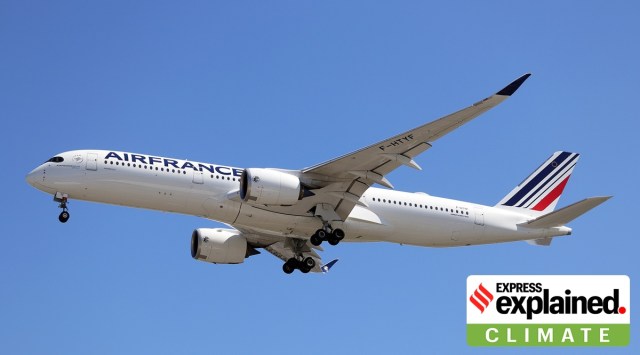France bans short-haul domestic flights: Can curbs on airplane emissions help fight climate change
Aviation is a relatively small contributor to global greenhouse gas emissions, and attempts to curtail these have not been very fruitful till now. These fresh measures are also likely to yield only marginal dividends.
 France, last week, became the first country in the world to impose a ban on short-haul domestic flights. The country brought in a new law, effective from May 23, that bars air travel to destinations that can be covered by up to two-and-a-half hour journey by train. (Photo: Wikimedia Commons)
France, last week, became the first country in the world to impose a ban on short-haul domestic flights. The country brought in a new law, effective from May 23, that bars air travel to destinations that can be covered by up to two-and-a-half hour journey by train. (Photo: Wikimedia Commons) Last week, France announced a ban on all short-haul domestic flights. A month earlier, the Schiphol airport in Amsterdam, one of the busiest in Europe, banned private jets and small business planes. There is a growing clamour in Europe for a bigger crackdown on private aviation sector.
As the world continues to fall behind in the race against time to curb global warming, desperate and non-conventional measures seem to be beginning to kick in. Aviation is a relatively small contributor to global greenhouse gas emissions, and attempts to curtail these have not been very fruitful till now. These fresh measures are also likely to yield only marginal dividends.
The French ban
France, last week, became the first country in the world to impose a ban on short-haul domestic flights. The country brought in a new law, effective from May 23, that bars air travel to destinations that can be covered by up to two-and-a-half hour journey by train. As of now, only three routes are affected by this law — those to the cities of Lyon, Nantes and Bordeaux from Paris — the Le Monde newspaper reported.
While the French law has great headline value, its impact on curbing emissions was unlikely to be anything more than nominal. Air transport, globally, accounts for just about 2 per cent of global carbon dioxide emissions every year, and less than two per cent of greenhouse gas emissions. The three cancelled routes would have been contributing a minuscule part of the total emissions from aviation.
Besides, there is no way to ensure that passengers prevented from taking a flight would necessarily travel by train. The law can possibly push more people to use their cars to make the journey, thus nullifying whatever little gains that could have accrued by the avoided air travel.
Crackdown on private jets
But there is a growing demand for a wider crackdown on private aviation. France, the Netherlands, Austria and Ireland last week urged the European Union to strengthen regulations to discourage travel by private jets, a Reuters report said. In fact, the Schiphol airport in Amsterdam said in April it would no longer allow private and small business aircraft to operate.
“We believe that greater attention must be drawn to this issue at EU level, especially by assessing the possibility of setting up stronger regulatory measures on private jet travel to make sure that everyone contributes their fair share to the overall decarbonisation effort,” the four countries said in a document, according to the Reuters report.
Last week, protestors disrupted flights at the Geneva airport in Switzerland while making a similar demand to ban private jets.
Private jets, usually far more inefficient than large commercial airliners, have always been a big eyesore from the climate perspective. In a recent report, a clean transport campaign group in Europe called Transport and Environment estimated that private jets were 5 to 14 times more polluting, per passenger, than commercial planes, and 50 times more polluting than trains. It said private planes could emitting about 2 tonnes of carbon dioxide every hour, while an average person in Europe emits about 8.2 tonnes of carbon dioxide equivalent in an entire year.
And yet, the trend of using private planes has been increasing rapidly. A Reuters report last week, quoting a Greenpeace study, said private flights in Europe had increased by 64 per cent in 2022, and emitted more than 5.3 million tonnes of CO2.
Ironically, hundreds of private planes arrive at the annual climate conference every year, with the rich and the famous jetting in to talk about the need to reduce carbon emissions.
Emissions from Aviation
Though the airline industry’s contribution to the overall greenhouse gas emissions has been rather modest, it is still considered a big worry, mainly due to two reasons — it is generated by a very small fraction of global population, and it is projected to grow at a very fast pace. Also, airplanes produce non-CO2 emissions as well, and their impact on global warming is equally significant. According to the UN Climate Change, if the non-CO2 emissions, like water vapour, are also accounted for, the airline industry would be responsible for causing almost five per cent of historical global warming.
But a bigger worry is that emissions from international aviation falls in a grey area. The emissions from planes flying within the boundaries of a country are attributed to that country. But emissions from airlines making international flights are not attributable to any country. Along with international shipping, international aviation forms a separate class of emissions — those from bunker fuel. It also means that no country has any responsibility to curtail these emissions. These are not covered under the Paris Agreement.
Offset mechanism
But there have been attempts, nonetheless, to restrict emissions from aviation sector. In 2016, the International Civil Aviation Organisation (ICAO) put in place an offset mechanism to ensure that any increase in emissions over 2020 levels is compensated for by the airline industry through investment in carbon saving projects elsewhere. Called Carbon Offsetting and Reduction Scheme for International Aviation, or CORSIA, the offset plan is supposed to run from 2021 to 2035.
CORSIA is considered a breakthrough, but it is not very ambitious. It only seeks to offset emissions that are over and above 2020 levels. It does not deal with total emissions.
Reducing aviation emissions through other means has not proved to be easy. Unlike road or rail travel, aviation does not have viable technology alternatives for shifting to cleaner fuels. Biofuels have been tried and so have hydrogen fuel cells. Solar powered planes have also made trips. But use of these alternative fuels for flying large commercial airliners is still some distance away.
Photos



- 01
- 02
- 03
- 04
- 05



































